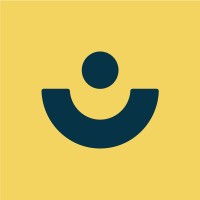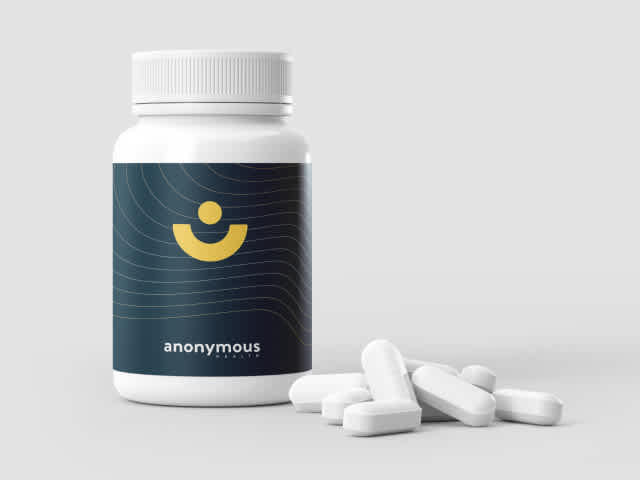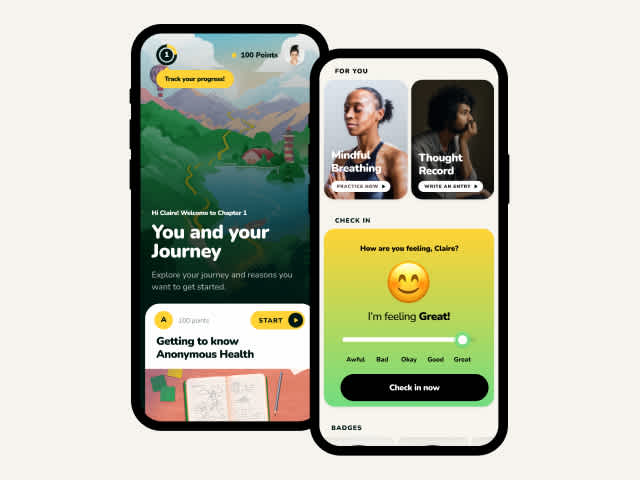Alaska, United States
Anonymous Health - Alaska
Claimed
Claimed
Recovery.com has connected directly with this treatment provider to validate the information in their profile.
Provider's Policy
Anonymous Health accepts most forms of insurance, including Alaska Medicaid.
Estimated Cash Pay Rate
The cost listed here (Call for insurance) is an estimate of the cash pay price. Center pricing can vary based on program and length of stay. Contact the center for more information. Recovery.com strives for price transparency so you can make an informed decision.
About Anonymous Health - Alaska
Anonymous Health - Alaska provides virtual, outpatient addiction recovery services, treating both substance use disorders and compulsive behaviors. Their approach is private and confidential, keeping clients’ treatment between their doctor and insurance company. They combine effective evidence-based treatments with innovative technology to deliver personalized care. Anonymous Health offers medication-assisted treatment (MAT), individual and group therapy, and support through their dedicated mobile app, making addiction treatment both empowering and convenient. Of the 100s of millions of people who struggle with an unwanted habit or addiction, only a small fraction - just 7% - receive help. At Anonymous Health, we don’t think that’s okay.
"We are excited to help address long-standing capacity and access challenges of addiction care in Alaska," said Medical Director, Dr. Palani Chidambaram. "Our evidence-based teletherapy model uniquely combines whole-person addiction care therapies and is well-suited to adding much-needed counselors and medical providers in Alaska, where 1 in 6 U.S. adults struggles to manage a substance use disorder."
Giving Tools to Fight Back
Anonymous Health is dedicated to empowering individuals to reclaim their lives from addiction and compulsive behaviors. By merging cutting-edge technology with evidence-based treatments, they offer a dynamic mobile app that provides teletherapy counseling and cognitive behavioral therapy (CBT). Their mission is to equip clients with the tools needed to develop healthier habits, effectively manage addictions, and achieve lasting recovery. With continuous support and personalized care, Anonymous Health offers accessible and comprehensive treatment for all users.
Community and Peer Support
Anonymous Health fosters community and peer support through online group therapy sessions that connect clients with peers who share similar challenges. The app provides a platform for continuous interaction, support, and encouragement, helping individuals build a strong recovery network. This sense of community is crucial for long-term recovery, as it offers emotional support, shared experiences, and accountability. By integrating these elements, Anonymous Health offers a supportive space so clients are never alone in their recovery journeys.
Tailored Treatment Programs for Each Client
While Anonymous Health offers solely virtual treatment programs, each program is tailored towards the various addictions of each client, including alcohol, opioids, shopping, pornography, gambling, and more. Their programs include one-on-one teletherapy and group therapy sessions using cognitive behavioral therapy (CBT) and other evidence-based practices that help clients overcome addictions and develop healthier habits. Anonymous Health’s treatment plans can help to overcome co-occurring conditions, in particular, depressive symptoms that are often common in individuals with addiction.
Read More
Insurance Accepted
Provider's Policy:Anonymous Health accepts most forms of insurance, including Alaska Medicaid.
Reducing the Stigma
Anonymous Health is dedicated to reducing the stigma associated with addiction and mental health issues. They aim to create an environment where individuals feel safe and supported in seeking help. By offering accessible and confidential treatment through their mobile app, they create a space where clients can receive care discreetly and comfortably. Their approach helps to normalize conversations about addiction and recovery.
Medication to Beat Cravings
Anonymous Health offers medication-assisted treatment (MAT) to help clients manage and overcome cravings associated with substance use disorders. Through their mobile app, clients can receive prescriptions for medications that reduce cravings and withdrawal symptoms.The app offers continuous access to medical professionals who can adjust their treatment as needed, providing a crucial layer of support in their recovery journey.
Flexible Support on Clients' Schedules
Anonymous Health offers a flexible program designed to fit into clients' schedules, making it easy to receive help when they need it. Through their comprehensive mobile app, clients can access teletherapy counseling, cognitive behavioral therapy (CBT), and medication-assisted treatment (MAT) at their convenience. This approach allows individuals to balance their recovery with daily responsibilities, providing continuous support through video sessions, secure messaging, and online group therapy. The flexibility of the program provides clients the opportunity to receive the care they need without disrupting their routines.
Supported Conditions
Anonymous Health provides treatment for a wide range of conditions, including substance use disorders such as alcohol and opioids, and behavioral addictions like internet, gaming, gambling, and shopping addictions. They also address compulsive behaviors, including pornography addiction. Using a comprehensive mobile app, they offer teletherapy counseling, cognitive behavioral therapy (CBT), and medication-assisted treatment (MAT) as needed.

Center Overview
Estimated Cash Pay Rate
Older Adults
Addiction and mental health treatment caters to adults 55+ and the age-specific challenges that can come with recovery, wellness, and overall happiness.
Adolescents
Teens receive the treatment they need for mental health disorders and addiction, with the added support of educational and vocational services.
Executives
Executive treatment programs typically directly support the needs of people who manage businesses and may provide flexible schedules and office space to allow work during treatment.
Young Adults
Emerging adults ages 18-25 receive treatment catered to the unique challenges of early adulthood, like college, risky behaviors, and vocational struggles.
LGBTQ+
Addiction and mental illnesses in the LGBTQ+ community must be treated with an affirming, safe, and relevant approach, which many centers provide.
Men and Women
Men and women attend treatment for addiction in a co-ed setting, going to therapy groups together to share experiences, struggles, and successes.
Midlife Adults
For adults ages 40+, treatment shifts to focus on the unique challenges, blocks, and risk factors of their age group, and unites peers in a similar community.
Mild Disabilities
Adults with mild physical or intellectual disabilities receive treatment catered to their specific needs in a safe and clinically supportive environment.
Pregnant Women
Addiction and mental health treatment meets the clinical and psychological needs of pregnant women, ensuring they receive optimal care in all areas.
Professionals
Busy, high-ranking professionals get the personalized treatment they need with greater accommodations for work, privacy, and outside communication.
Veterans
Patients who completed active military duty receive specialized treatment focused on trauma, grief, loss, and finding a new work-life balance.
Treatment Focus
This center treats primary substance use disorders and co-occurring mental health conditions. Your treatment plan addresses each condition at once with personalized, compassionate care for comprehensive healing.

Care Options








Treatment
Specializations
Alcohol
Using alcohol as a coping mechanism, or drinking excessively throughout the week, signals an alcohol use disorder.
Drug Addiction
Drug addiction is the excessive and repetitive use of substances, despite harmful consequences to a person's life, health, and relationships.
Gambling
Excessive, repetitive gambling causes financial and interpersonal problems. This addiction can interfere with work, friendships, and familial relationships.
Opioids
Opioids produce pain-relief and euphoria, which can lead to addiction. This class of drugs includes prescribed medication and the illegal drug heroin.
Approaches
Evidence-Based
A combination of scientifically rooted therapies and treatments make up evidence-based care, defined by their measured and proven results.
Individual Treatment
Individual care meets the needs of each patient, using personalized treatment to provide them the most relevant care and greatest chance of success.
Personalized Treatment
The specific needs, histories, and conditions of individual patients receive personalized, highly relevant care throughout their recovery journey.
Therapies
1-on-1 Counseling
Patient and therapist meet 1-on-1 to work through difficult emotions and behavioral challenges in a personal, private setting.
Meditation & Mindfulness
A practiced state of mind that brings patients to the present. It allows them to become fully aware of themselves, their feelings, and the present moment.
Online Therapy
Patients can connect with a therapist via videochat, messaging, email, or phone. Remote therapy makes treatment more accessible.
Mindfulness Therapy
This ancient practice can be mental, emotional, and even spiritual. In meditation, you focus your attention on the present moment without judgement.
Life Skills
Teaching life skills like cooking, cleaning, clear communication, and even basic math provides a strong foundation for continued recovery.
Medication-Assisted Treatment
Combined with behavioral therapy, prescribed medications can enhance treatment by relieving withdrawal symptoms and focus patients on their recovery.
Mindfulness-Based Cognitive Therapy
MBCT combines mindfulness practices—like meditation—with cognitive therapy techniques to help patients work through negative thought patterns.
Motivational Interviewing and Enhancement Therapy (MET)
This approach is based on idea that motivation to change comes from within. Providers use a conversational framework that may help you commit to recovery.
Conditions We Treat
Pornography Addiction
A person with a porn addiction is emotionally dependent on pornography to the point that it interferes with their daily life and relationships.
Grief and Loss
Grief is a natural reaction to loss, but severe grief can interfere with your ability to function. You can get treatment for this condition.
Personality Disorders
Personality disorders destabilize the way a person thinks, feels, and behaves. If untreated, they can undermine relationships and lead to severe distress.
Anger
Although anger itself isn't a disorder, it can get out of hand. If this feeling interferes with your relationships and daily functioning, treatment can help.
Anxiety
Anxiety is a common mental health condition that can include excessive worry, panic attacks, physical tension, and increased blood pressure.
Burnout
Burnout entails mental and physical exhaustion, and leads to a severe lack of fulfillment. This condition is often caused by overwork.
Chronic Pain Management
Long-term physical pain can have an affect on mental health. Without support, it can also impact your daily life and even lead to addiction.
Codependency
Codependency is a pattern of emotional dependence and controlling behavior. It's most common among people with addicted loved ones.
Depression
Symptoms of depression may include fatigue, a sense of numbness, and loss of interest in activities. This condition can range from mild to severe.
Substances We Treat
Alcohol
Using alcohol as a coping mechanism, or drinking excessively throughout the week, signals an alcohol use disorder.
Benzodiazepines
Benzodiazepines are prescribed to treat anxiety and sleep issues. They are highly habit forming, and their abuse can cause mood changes and poor judgement.
Chronic Relapse
Consistent relapse occurs repeatedly, after partial recovery from addiction. This condition requires long-term treatment.
Co-Occurring Disorders
A person with multiple mental health diagnoses, such as addiction and depression, has co-occurring disorders also called dual diagnosis.
Cocaine
Cocaine is a stimulant with euphoric effects. Agitation, muscle ticks, psychosis, and heart issues are common symptoms of cocaine abuse.
Drug Addiction
Drug addiction is the excessive and repetitive use of substances, despite harmful consequences to a person's life, health, and relationships.
Ecstasy
Ecstasy is a stimulant that causes intense euphoria and heightened awareness. Abuse of this drug can trigger depression, insomnia, and memory problems.
Heroin
Heroin is a highly addictive and illegal opioid. It can cause insomnia, collapsed veins, heart issues, and additional mental health issues.
Methamphetamine
Methamphetamine, or meth, increases energy, agitation, and paranoia. Long-term use can result in severe physical and mental health issues.
Professional Staff

Dr. Angie Chen
Advisor

Susan “Becky” Williamson
Counselor

Charlie Engle
Recovery Director and Spokesperson

McKenzie Holland
Counselor
View More Team Members
We love hearing about your treatment experience
Help individuals and families seeking treatment by sharing your first-hand experience with this treatment provider. Review Guidelines.























